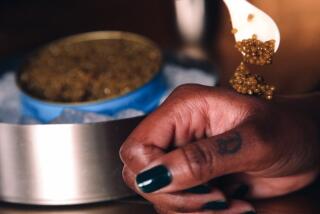French Goose Growers Fear Imported Livers May Be Their Swan Song : * Agriculture: The price of the delicacy <i> foie gras </i> has plummeted as Eastern European countries jump in to the market.
- Share via
PARIS — Roast turkey or sugared ham may be the main course of most traditional Christmas tables, but the piece de resistance of any self-respecting French host is the dense, calorie-laden goose liver delicacy foie gras.
This year the pride of French gastronomy is at the center of an unlikely East-West war, fought with price cuts, customs raids and seizures of imported products.
The growing crisis in France’s foie gras industry, caused by a flood of imports and increased domestic production, has left many liver producers unable to meet their costs and some on the verge of bankruptcy.
With the Cold War over, Eastern European countries--where Bohemian Jews first invented the method of force-feeding geese to swell their livers--have refocused on the long-neglected industry.
Lower-priced imports, notably from Hungary, have sent foie gras prices plummeting in France, threatening the livelihood of about 20,000 poultry breeders in the rugged southwest region of Perigord, where 75% of the fatty livers are produced.
Hungary, which used to supply only a fraction of the goose livers sent to Perigord for canning, suddenly began producing duck livers, cutting into a market monopolized by the French.
“Three or four years ago, the Hungarians started producing duck livers. What we’re faced with now is people who are very competent in force-feeding,” said Odile Dupuis, the Agriculture Ministry’s specialist on foie gras.
Simultaneously, French farmers found that breeding geese and ducks for their livers was more lucrative than raising other types of livestock. They increased their production of foie gras, adding to the downward tug on prices.
Earlier this year, as farmers across France protested against falling incomes and imports from the East, foie gras producers stoned government offices in Perigueux, Perigord’s main town.
In the southern town of Figeac, they held up trucks carrying foreign livers and threatened to burn their contents. The sight of rich goose livers strewn across country roads was enough to make any proud Frenchman weep.
Marie-Pierre Pe, spokeswoman for the National Foie Gras Trade Committee, said retail prices have fallen 10% to 20% the past three years.
Last year the Gulf crisis and recession fears aggravated the effects of a flooded market. Many canning firms had trouble selling off their stocks, she said.
“In 1990, French canners had between 800 and 1,000 tons of foie gras left over out of an annual production of about 8,600 tons,” she said.
To boost the struggling industry, Agriculture Minister Louis Mermaz announced a $4-million emergency “ foie gras plan” last week.
The money will be spent on upgrading slaughterhouses and force-feeding centers, giving technical advice to breeders and tightening border controls to crack down on uncertified imports.
A special allowance has also been set aside to aid breeders in particular difficulty.
The European Community has turned down repeated Agriculture Ministry requests for quotas to limit imports of swollen livers.
“Twice, in December, 1990, and July, 1991, Brussels refused our demands,” Pe said. “They don’t think it’s necessary.”
Farmers were worried that “inferior” Eastern livers, from geese and ducks they said were not being raised according to strict French regulations, were smearing their reputation.
Pe said the European Community set strict standards for foie gras last June to uphold its quality.
“A duck liver must weigh at least 250 grams (eight ounces) and a goose liver 450 grams (one pound),” she said. “Otherwise, they are considered skinny livers, not fat livers.”
The expensive little fat-filled cans, however, have remained an almost exclusively French delicacy. France accounts for 85% of worldwide consumption of foie gras, and the French eat 60% of it during the Christmas season.
Outside France, eating foie gras is gradually becoming as socially unacceptable as wearing a fur coat.
Campaigns by animal rights groups against force-feeding have already pushed Swiss food retailers Schweiss Co-op and Migros--and the Moevenpick restaurant chain--to stop selling it.
“It is the equivalent of being forced to eat eight kilos (18 pounds) of spaghetti every day for four weeks. It’s terribly painful,” one animal rights activist said.
More to Read
Sign up for Essential California
The most important California stories and recommendations in your inbox every morning.
You may occasionally receive promotional content from the Los Angeles Times.













